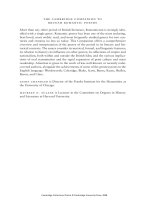The cambridge companion to british roman 57
Bạn đang xem bản rút gọn của tài liệu. Xem và tải ngay bản đầy đủ của tài liệu tại đây (45.88 KB, 1 trang )
2
NICK GROOM
Romantic poetry and antiquity
In “The Four Ages of Poetry” (1820), Thomas Love Peacock archly complained that contemporary poetry was absurdly derivative of ancient models
of inspiration and composition: “While the historian and the philosopher
are advancing in, and accelerating, the progress of knowledge, the poet is
wallowing in the rubbish of departed ignorance, and raking up the ashes
of dead savages to find gewgaws [toys] and rattles for the grown babies
of the age.”1 He castigates Scott, Byron, Southey, Wordsworth, Coleridge,
Moore, and Campbell for their cannibalistic and anachronistic efforts, which
he sees as no more than patching together “disjointed relics of tradition and
fragments of second-hand observation” to produce “a modern-antique compound of frippery and barbarism.”2 It was indeed confidently believed that
ancient societies, whether British, Greek, or Roman, shared virtues of originality and genius, and that modern poets should mine these seams. Southey’s
preparation before writing his epic Madoc was to “study three works . . .
the Bible, Homer, and Ossian,” and Hazlitt argued that the four prototypes
of poetry were, similarly, the Bible, Homer, Ossian, and Dante.3
There is of course nothing new in Peacock’s attack: The Dunciad Variorum (1729) and the Memoirs of Martinus Scriblerus (1741) set the tone in
the eighteenth century for satirizing the enervated taste of antiquarians and
connoisseurs, and this mockery was carried through into the engravings of
Hogarth and Gillray. But there is something new in Peacock’s criticism of
the ubiquity of the antique and the arcane. Rather than disappearing before
the advance of science and the “march of mind,” ancient esoteric mysteries
seemed to have taken up permanent residence in the arts:
A poet in our times . . . lives in the days that are past. His ideas, thoughts,
feelings, associations, are all with barbarous manners, obsolete customs, and
exploded superstitions. The march of his intellect is like that of a crab, backward. The brighter the light diffused around him by the progress of reason,
the thicker is the darkness of antiquated barbarism, in which he buries himself
like a mole, to throw up the barren hillocks of his Cimmerian labours.4
35
Cambridge Collections Online © Cambridge University Press, 2008









